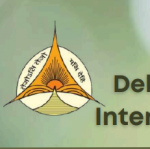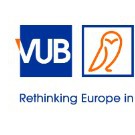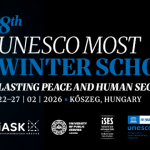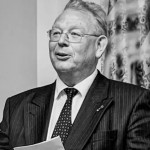In Memoriam Hans van Ginkel
By Luk Van Langenhove and Luc Soete, former directors of UNU-CRIS and UNU-MERIT
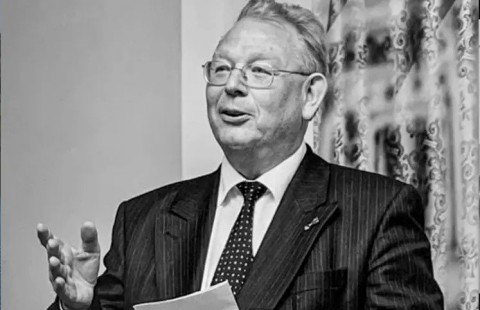
Hans van Ginkel, who passed away on Thursday, 27 July 2023, was a formidable figure by any standard. He was also one of those rare individuals who knew he could make a difference − and so he did through his times in charge of the largest Dutch university, Utrecht University, and the smallest international university, the United Nations University (UNU).
Intellectual, managerial and entrepreneurial
Intellectually, Hans was always ready to challenge the typical disciplinary prejudices popular in both the so-called “hard” natural sciences and the “soft” social and behavioural sciences, forcing others to broaden their perspectives on different views, environments and situations. His own life experience in Indonesia was undoubtedly instrumental in this; Hans was born in a Japanese prisoner of war camp in Sumatra, Indonesia on 22 June 1940. It wasn’t until after the end of World War II that he moved back with his brother and father to Holland, where he spent his school years in the village of Roermond.
In line with his diversified upbringing, Hans studied geography, a discipline he saw as integrating and bridging the natural sciences, humanities and social sciences with one another. Not surprisingly, inter- and trans-disciplinary approaches became a guiding principle of his intellectual endeavors, to the point of becoming his trademark, from his early days as Rector Magnificus at Utrecht University (1986-1997) through his Rectorship of UNU (1997-2007). Even after the latter, when he took on a special guest professorship back in Utrecht on sustainable urban futures, his multifaceted manner toward academia remained his leitmotif.
As a manager, by being particularly aware of the intrinsic limits of leading complex academic institutions, Hans always focused on how to further build on existing strengths of the nodes of the academic networks of which he was in charge, whether those were university faculties or the family of global experts housed collectively across the UNU institutes. Having held the longest ever rectorship of Utrecht University and one of the longest of UNU, he was well aware that universities needed to form strategic international alliances and continuously diversify these external networks to maintain their positions as centers of creativity and innovation. And while he also knew that society could not afford to lose control over the activities and direction of university institutions, he also believed universities needed to have a large degree of autonomy. During his tenure at UNU, Hans, above all, exhibited his consciousness that excessive centralized control would lead to bureaucracy and loss of innovative capacity.
From an entrepreneurial perspective, Hans acted as an initiator, a challenger and even a risk-taker when it came to new ideas as well as new institutional set-ups, often driven by dissatisfaction with existing structures. For example, during his rectorship in Utrecht, he illustrated his creative dynamism by being instrumental in bringing about the most radical physical transformation of the university, moving the faculties and research institutes out from the centre of the old town to the eastern part of the city (Uithof) and asking renowned Dutch architect Rem Koolhaas to develop the new university campus concept.
Leadership-wise, in typical Dutch fashion Hans would express the way he saw things rather directly, but at the same time, he never failed to motivate and respect the support and administrative staff working for him. Whereas bluntness hinders many Dutch politicians from making much impact at the international level, Hans developed a good sense of “slow diplomacy,” able to see how things would play out − how “the hares would run” as they say in Dutch − in international circles and act strategically. The Utrecht University newspaper even once described him as “having more political influence than [former Dutch prime ministers] Lubbers, Balkenende and [former Dutch development cooperation minister] Pronk put together.”
Tenure at UNU: Europe, Japan and beyond
By all accounts, Hans’s UNU rectorship, based at the UNU headquarters in Tokyo, similarly became a period of highly innovative initiatives. He convinced then UN Secretary-General Kofi Annan that UNU should hold similar importance within the UN as any other agency, thereby making the UNU Rector part of the Secretary-General’s Chief Executives’ Board. In Japan, despite the tragedy Hans had endured as a child in Indonesia, he established a close connection with the Japanese Imperial Family. At the level of UNU institutions, he both strengthened and radically expanded the network.
The relationships that Luk Van Langenhove and Luc Soete, the authors of this obituary, held with Hans began differently yet were similarly close and brought us to work together, beginning in the mid-1990s. Hans was instrumental in the creation and transformation of the UNU institutes we were asked to direct, though initially neither of us could have imagined we’d become colleagues as UNU Directors. Luk became closely involved with the creation of UNU-CRIS (the UNU on Comparative Regional Integration Studies) in Bruges, Belgium, which achieved funding from sub-national regional authorities − a novelty within the UNU network at that time. Luc, meanwhile, became the “merging” director of UNU-INTECH (the UNU Institute for New Technologies) and MERIT (the Maastricht Economic and Social Research Institute on Innovation and Technology), creating UNU-MERIT in Maastricht, which became the second-largest UNU institute.
Other institutes such as UNU-EHS (Environment and Human Security) in Bonn, Germany, and UNU-IIGH (International Institute for Global Health) in Kuala Lumpur, Malaysia were created along with other major programmes and operating units in Cameroon, Côte d'Ivoire, Japan, Jordan, Namibia, Senegal and Spain. But Hans also started initiatives that were more practice-oriented than academic, and these still flourish, such as the Regional Centres of Expertise on Education for Sustainable Development (RCEs) – an initiative in which both Luc and Luk became involved. In typical Hans style, we were repeatedly challenged to broaden our perspectives, to become closely involved in such new endeavors, sometimes simply as helping hands with potential funding ministries and other times taking up extra assignments on-the-ground, such as Luk running the Paris office of UNU at the UNESCO headquarters there or kick-starting the former UNU institute in Barcelona. Not every effort ultimately materialized or proved sustainable, such as the UNUs attempted in Algeria and Barcelona, but Hans was not afraid to fail − and when failure happened, he communicated about it openly and moved swiftly on to the next new challenge. For all these reasons, we both had a special connection with him and his wife, Bep.
In the 1990s, Luk was the deputy secretary-general of the Belgian Ministry of Science Policy, and in that capacity, he was the representative of the Belgian federal government in the governance board of the College of Europe in Bruges. He met Hans there in the aftermath of the creation of BRIOSS (Bruges Research Initiative for Opening the Social Sciences), which began in 1997, just when Hans had been appointed as rector of UNU. BRIOSS had the ambition to become an epistemic community and even received financial support from the monks of Westvleteren along with endorsement from the academic council of the College of Europe. From BRIOSS, UNU-CRIS was born.
Luc, on his side, had been appointed Professor of International Economics at the Faculty of Economics of Maastricht University in 1986 and was closely involved in the feasibility study and creation of UNU-INTECH that happened at the time. The MERIT institute was set up in 1988 at Maastricht University as a sort of forerunner of UNU-INTECH, which was created two years later. Charles Cooper, who had been Luc’s PhD promotor at Sussex University, became the first UNU-INTECH director. Given his old student roots in nearby Roermond, Hans, who was then in his rectorship at Utrecht University, took a particular interest in these developments, the more so when he joined the UNU Council in 1992, prior to his rectorship. From the beginning, UNU-INTECH and MERIT worked closely together, setting up first a joint master’s programme and, later on, a joint PhD programme. As a result, Luc got to know Hans as he was each year invited to attend the international advisory board. Ultimately, it led to the merger and creation of UNU-MERIT in 2005.
Involvement in the creation of UNU-CRIS
The involvement of Hans in Bruges was a typical example of his signature slow diplomacy.
First, there was a series of seemingly unrelated events that paved the way and shaped the minds for a social sciences initiative at UNU. In Belgium it had started with Immanuel Wallerstein’s book Open the Social Sciences that stirred a lot of interest. When it was translated into Dutch in 1996, three Vrije Universiteit Brussel professors including Luk wrote a postscript with specific recommendations on how Belgian universities could “open up” their social sciences departments. One of those recommendations was to create integrated research programmes within the universities that cut across disciplinary structures. This was in line with a Dutch initiative to re-think the social sciences in which Hans was involved. Soon Luk and Hans discovered they were on the same wave-length in the struggle against the disciplinary divides.
Enter the illustrious vice-chancellor of Ghent university, Leon Demeyer. Demeyer was in those days also member of the Council of the College as representative of the Flemish Government. When he heard about the dream to establish an interdisciplinary social sciences initiative in Bruges, he immediately thought of his good friend Hans, then rector of Utrecht University but already appointed to the UNU rectorship. Demeyer arranged a lunch with Hans in Utrecht where he introduced him to Luk. It was during that long lunch that Hans convinced the others to bring a focus on regions and regional governance into BRIOSS (not surprising for a geographer) and also proposed to examine whether or not such a focused BRIOSS could become part of the UNU network.
Soon after Hans started his rectorship in Tokyo, he invited Luk and his other Vrije Universiteit Brussel colleague Jean-Claude Burgelman to come to Tokyo. Luk and Jean-Claude expected a formal negotiation with a UNU delegation, so they were surprised to instead arrive to a dinner with Hans, his wife Bep and Max Bond, who was then the executive officer of UNU. It became immediately clear that Hans had firm ideas on what he wanted: a new UNU centre in Bruges focused upon reginal integration, hosted by the College of Europe and financially supported by the Flemish government. A feasibility study team of which Luk served as chair was set up, including Luc, Jean-Claude and other VUB and College academics (Léonce Bekemans, John Groom and Peter Fleissner).
When the report was finished, Luk was invited to present the results at a UNU Council meeting in Macau. He did not realize at that moment that his passage in Macau also served another purpose (as Hans told him later): to make him known by the UNU vice-rectors, directors and council members, so they could be convinced that he was the right person to become the founding director of the new UNU institute. After negotiations with the Flemish Government (represented by Marc Luwel), BRIOSS became first informally called “Triple I” (standing for integration, innovation and interdisciplinary) and then UNU-CRIS. In March 2000, a first memorandum of understanding (MOU) was signed between the UNU, the College of Europe and the Flemish Government, and in November 2000, the UNU Council decided to create UNU-CRIS as a new research and training programme. The Flemish Government decided in July 2001 to support UNU-CRIS, and in September 2001, a second MOU was signed.
Finally, a psychologist, Luk was appointed as the founding director of UNU-CRIS, an institute with a focus on regions. The Belgian prime minister Jean-Luc Dehaene and Flemish minister Marleen Vanderpoorten gave the opening speeches on 14 March 2000. The agreement between UNU, Flanders and the College was tailored to Flanders specificities, as Hans felt that this was the only way to get the funding right, so there was no endowment funding and instead an annual contribution, with the funds managed outside the UNU but within the College.
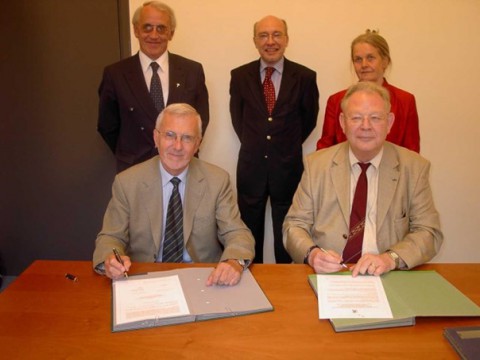
Clockwise, from top left: Professor Eric Vanden Berghe, President of the Episcopal Seminary; Professor Luk Van Langenhove, Director of UNU-CRIS; unknown; Professor Hans van Ginkel, UNU Rector; Professor Paul Demaret, Rector of the College of Europe.
During this start-up process, Hans and Luk continued working together on the rethinking of the social sciences initiative in a series of high-level workshops organized by the OECD and UNESCO and with support of the Gulbenkian Foundation.
A cherished legacy
The history of UNU is embedded with the unique figure of Hans van Ginkel. We both owe a large portion of our careers to him. With so many other social sciences scholars, friends and colleagues in Bruges, Maastricht, Tokyo and so many other places in the world, we will deeply miss him, but comforting us are many fond memories we will always cherish.
Luc Soete Luk Van Langenhove
Former director of UNU-MERIT Former director of UNU-CRIS

